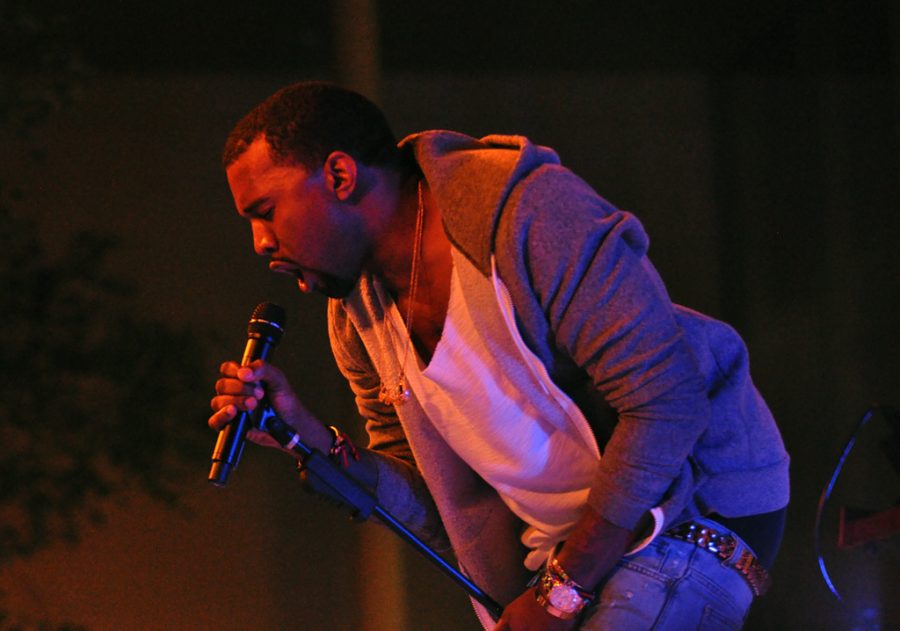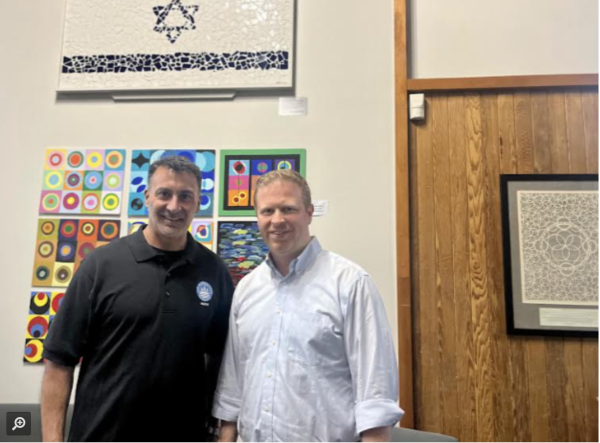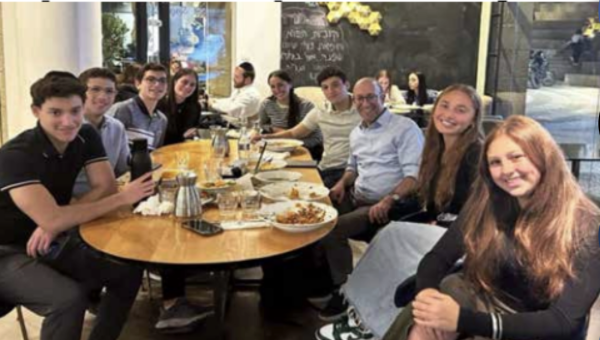Ye or Nay: Milken Students and Faculty Weigh in on Kanye’s Antisemitism
One week ago, Joshua Fisher ‘23 and Julia Nahmod ‘24, the two directors of the Milken Morning Show, thought that Ye’s antisemitic remarks would blow over. “Good Morning,” one of the most popular songs by Ye, formerly known as Kanye West, remained the theme song of the show. “I’m a very big believer in separating the art and the artist,” Nahmod said.
In the next week, Ye doubled down on his words. He confirmed his antisemitic beliefs, and blamed the “Jewish underground media mafia” for silencing him. The 405 freeway was draped with posters reading, “Kanye is right about the Jews” and Los Angeles neighborhoods started filling with antisemitic flyers. Just a few days later, the song was pulled from the intro. “Because we are at a Jewish school,” Nahmod explained, “It would be ridiculously inappropriate to continue using the song.”
But Ye’s impact on Milken’s community extends far beyond the morning show intro. Students walk through campus wearing slides from Ye’s fashion brand, Yeezy, and sit through lunch listening to his songs play through the amphitheater speaker. As the effects of his antisemitic rhetoric became increasingly clear, students began to speak up. The Roar has compiled a list of responses with student’s and faculty member’s responses to the antisemitic statements and growing antisemitism in the community.
”It’s tragic to see such a talented artist spout such hateful rhetoric.” – Josh Roussak ‘23
”Kanye’s attitude towards the Jewish community is not only antisemitic, but a step backward in his career.” – Rex Tabachnick ‘23
“Kanye has a vendetta against the media and he’s scapegoating the Jews.” – Noah Weissberg ‘23
Ye’s Influence:
Many are worried about Ye’s influence on young people.
“He does have a really big inspiration on so many kids, especially our age. Everyone loves Kanye. I worry because his words really mean something, he has a big platform.” – Sophia Mani ‘23
“It’s not so much that I’m worried about him and what he has to say, but how loyal his fanbase is.” – Mr. Ira Madnikoff, U.S. Government Teacher
“He’s a very influential person and his words hold value and magnitude. I’m worried.” – Lauren Lieberman ‘23
Impact:
Mr. Sean Herstein, a Jewish Studies Teacher & Division 9-10 House Leader, says that words like these can have real-world consequences. “We’ve always had acts of vandalism or antisemitic attacks on individuals that seem to have come out of nowhere. The reality is that those instances increase in number and in seriousness after influential people say things that are antisemitic because they are empowered… What he said is inspiring other people to take actions and say things that hurt other people.”
Others say that they’re less worried.
“I think [Ye] may have crossed a line, [but] I don’t think I feel less safe. Anti-Semitism hasn’t sprung into existence suddenly. Our school itself was vandalized one or two years back with anti-semitic statements. People have been attacking Jews in the streets for being Jewish. Every couple months or every year there’s an incident that exposes the antisemitism that exists in Southern California.” – Benny Signer ‘24
“Verbally, nothing gets to me, unless there’s some sort of acts of violence that are going on against Jews, which there is not. I don’t see how it’s ever going to affect me.” – Julia Nahmod ‘24
However, some students and faculty have already started seeing Ye’s impacts in their own neighborhoods.
“I know that in my neighborhood alone, we’ve had flyers and posters posted about Jews controlling the media or that Jews created Covid.” – Sara Goldin ‘23
“My grandmother lives in Westwood. An antisemitic poster was put in her mailbox and posted on the trees in front of her house. It’s a very Jewish neighborhood.” – Brooke Abselet ‘23
“It made me and this community feel vulnerable and spotlighted.” – Mr. Beau Lindsay, 11-12 Division Head
Students say that this will affect the way that they present themselves publicly.
“Kanye has affected the way I think about showing Judaism on social media because anyone can see that. I really thought about taking down the post I had from TIF that says I was at Alexander Muss High School once I go to college. While I don’t believe Israel is a colony, some people I might meet do.” – Brooke Abselet ‘23
“I’m not visually Jewish in a lot of ways. I don’t look Jewish to a lot of people, I don’t wear a star of David so I do [feel safe]. But I feel that if I were to speak out about my Judaism, I probably wouldn’t [feel safe].” – James Greer ‘24
Teachers shared a similar sentiment.
“For the last fifteen years, I didn’t personally experience any particular antisemitic comments to me, but in the last three months I’ve experienced two. I don’t know if there’s a connection but I know that there have been more acts of antisemitism in the last few years than there were prior” – Mr. Herstein
Mr. Gabriel Meyerson, Israel Education Chair, says that this is part of a larger trend. “I think that Kanye West’s statements are reflective of a general erosion in people’s reluctance to express their antisemitism. This is something that’s been happening over the past six, seven, years, going back to the march in Charlottesville in 2017. Between that, to Ilhan Omar’s ‘It’s all about the Benjamins’ tweet about Israel support, all this, the permissibility of speaking and using antisemitic language has increased, and antisemitic actions. That has all increased over the last seven, eight years, and that makes me concerned. I don’t feel personally threatened when I wear a kippah around. I live in a Jewish neighborhood.”
He also spoke about the connection between antisemitism and anti-zionism.
“I think in a lot of the public, Israel is very much equated with [Judaism]. And, therefore, when there’s an increase in anti-Israel sentiment, like during the conflict in Gaza in 2021, that led to an uptick in antisemitic incidents. It’s possible the inverse will also be true.” – Mr. Meyerson
Many educators and administrations emphasized the importance of placing Ye’s words in the larger context of antisemitism. “I think that the ability to be aware… is the most important piece,” Dr. Shulkind said, “and to understand that it’s not just something that [Ye] said but it’s a historical trope that’s gone on for thousands and thousands of years.”
“[We need to] make sure that the students understand: What is the history of antisemitism; how does this act fit within that picture… Our main job is to teach, and to show support and solidarity with the community” – Mr. Herstein
Ben M. Freeman, author of the book Jewish Pride, addressed the 11-12 Division on Wednesday. He helped students understand where Ye’s antisemitic comments come from. Speaking about Jewish conspiracy theories, Freeman said, “This is a narrative that people have been spouting for thousands of years, and that is the narrative that Kanye West is spouting.”
Jewish Obligation:
Many called on the Jewish people to do more.
“I think that we as Jews have not been contributing enough. I think as a population of 15 million people, we are a very small group. As you might know, Kanye West has more followers on social media than the actual population of Jews, and I think as a people we have not been doing enough. We as Jews have not been standing up enough and I think we should be doing more.” – Aiden Yedidsion ‘24
“The most productive way that we could probably deal with this is to have him sit down with a Jewish educator and go over why he’s saying what he’s saying, and why it’s so offensive and dangerous.” – Mr. Daniel Kracer, Psychology Teacher
“As Jews we have an obligation to educate ourselves and we also need to make sure we have partners in the general community who are also passionate about battling all forms of racism and discrimination including antisemitism, and making sure that antisemitism is included in that conversation. We also have an obligation to respond. We can’t just let it happen and not respond” – Mr. Herstein
“I think that it’s important for me as a Jew of color. When I ask for people to stand with me in opposition to racism that I see against Black people in the United States, I have to also be called upon and be expected to stand with my Jewish folks when it comes to antisemitism here in the United States. If I’m not there for them, they’re not going to be there for me.” – Ms. Sirida Terk, Coordinator of Diversity and Inclusion & Social Science Instructional Leader
At a town meeting, one student questioned why Drake, the famous Jewish rapper, has yet to speak on Ye’s antisemitic remarks. In December, Drake and Ye graced the stage at the Coliseum after a longtime public feud.
Holding Non-Jews Accountable:
However, not all believe that the onus is on the Jewish community.
“I think it’s complicated putting the onus on Jews, and especially us as Jewish day school students. Fixing this problem, like Ben Freeman said today, is not our responsibility because we’re not the ones who are being antisemitic and we’re not doing anything to incite these antisemitic attacks. I think that we absolutely need to raise awareness, and I think that we need to do our best to educate, but it’s also not our job to educate.” – Ayla Kattler ‘23
“This is a non-Jewish problem that needs to be worked on by non-Jewish people. It’s not for our community or our school to fix. It’s [a time] for us to be proud and to build, but not to respond to the negativity… People ask, ‘What can the Jewish community do?’ Well, what can the non-Jewish community do?” – Mr. Lindsay
“I think Jews are reacting to this very well, [but] I think there hasn’t been enough support from non-Jews… Non-Jews have not been condemning him enough.” – Evan Simon ‘24
Continuing to Support Ye:
People spoke of the importance of individual choice.
“I think that we need to be really conscious about who we support—who we follow on social media [and] what products we consume. Make sure that we are representing ourselves well and not being afraid to speak our mind when people are being antisemitic or racist, Ayla Kattler ‘23 explained. “We need to hold our celebrities to higher standards. I don’t think we can slack off in the way that we are holding people accountable.”
Further, Kattler explained, “It’s all about the money. If [celebrities] start being dropped by brands, if their products are pulled, that is potentially one of the only ways that they are going to know that something bad has happened. Obviously they can apologize on Good Morning America, but they’re not going to learn unless there are repercussions. Boycotting certain products and signing petitions—that’s what we can do to hold them to a higher standard.”
“It’s a very personal and intimate decision… but the one thing I will say is: Opt in. My recommendation is: Opt into a conversation, opt into opportunities, lean into the discomfort of this conversation and don’t shy away from however that ends up playing out in your life…” – Ms. Limor Dankner, Associate Head of School for Academic Affairs and Strategic Initiatives
Ms. Dankner said that she was proud of students for standing up for their Jewish identity. “We have athletes that just decided to just put duct tape [over the Adidas logos on their athletics uniforms]… I’ve seen kids’ social media and I’ve seen a lot of #JewishAndProud.”
Accountability:
Students believe that there’s a lack of accountability for antisemitic celebrities like Ye.
“This is the last straw.” – Sophia Novian ‘23
“We don’t have consequences for antisemitism in this country. It’s not viewed as a form of hatred to the degree where racism and homophobia are.” – Sara Goldin ‘23
“Kanye is super racist, and no one is talking about that. We draw the line at antisemitism, but he has said so much problematic stuff before this has even happened, and only now is he being dropped.” – Ayla Kattler ‘23
Asked whether they would keep listening to his music or wearing his clothing, Milken students and faculty shared a variety of answers.
“I would not listen to it. For example, I grew up as a huge Michael Jackson fan. I can’t listen to his music anymore. If a Michael Jackson song comes up, I turn it off.” – Mr. Meyerson
“I think separating the art from the artist only works when the artist isn’t benefiting from people consuming their art. So with Kanye, if you listen to his music on any popular streaming platform, he gets money from that and that money allows him to keep his platform [and] keep spreading hate.” – James Greer ‘24
“It’s hard to separate art from the artist when the artist in question wants to kill my people” – Mikaela Chemerinski ‘23
“I deleted him off my playlist” – Mason Miller ‘23
“I will not buy any of his products or show any other form of support.” – Noah Rad ‘25
“I don’t have to make them richer and I don’t have to give them my support, when they have chosen to take an open stance against something or for something that just does not align with my value system.” – Mr. Madnikoff
Others differed.
“I don’t need to think about the artist while listening to some music… I think that you can listen to music without liking the person or respecting the person.” – Theo Frank ‘23
“Obviously, I don’t like that he’s antisemitic, but ‘Violent Crimes’ is the best song of all time.” – Adam Kohankabir ‘23
“I think listening to music is different than wearing his clothes. I think it’s more acceptable to listen to his music.” – Eli Pournazarian ‘24
Some said that they’ll wait before returning to Ye’s discography.
“Right now, I find it hard to enjoy his music, but I will probably end up listening to it again.” – Noah Weissberg ‘23
“I think he needs to become self-aware and admit to what he did because he’s not owning up to anything. Once he does that and hopefully betters himself in some way, I don’t know that I’ll be a full supporter, but I feel like if an effort is being made from one side, an effort can also be made from the other.” – Lauren Lieberman ‘23
Adidas Controversy:
Considering Ye is a fashion designer and longtime partner of Adidas, many students took issue with continuing to represent certain brands. Before Adidas severed their ties with Ye, Milken administrators met with the football team to discuss steps forward. Football team members expressed their discomfort with wearing Adidas football uniforms at homecoming.
Eli Pournazarian ‘24, who plays on the football team, said that the team was disgusted following Ye’s antisemitic language. “We want to take action,” he stated. As a Jewish football team, he said that, “It’s our responsibility to infuse more Jewish things into how we play football and some of the things that we wear.” As a result, the football team released an official statement: “In light of Adidas’s hesitance and lack of swift action to drop Kanye West after his tirade of unacceptable anti-semitic statements, the team has elected to wear their all white Under Armour uniforms from last year at tomorrow’s homecoming game instead their current Adidas ones from this year. We do not condone any form of anti-semitism and stand in solidarity with our fellow Jewish brothers and sisters. The team will also run out with an Israeli flag and Hatikvah will be sung along with the Star Spangled Banner before the game.” Pournazarian suggests that students make posters promoting messages like, “Stop Jewish Hate.” Dr. Sarah Shulkind, the Head of School, says that the football team “wanted to use [homecoming] as an opportunity to express their pride in being Jewish.”
Many shared the football team’s discontent with Adidas’s delayed response.
“Well, I think it’s a great thing Adidas finally cut Ye off. I do, however, think it took too long to make a statement and I’m not convinced they did it for the right reasons. But I do respect it anyway, because it’s gonna cost them millions of dollars [and] because they are losing a very lucrative source of income,” – Ms. Tarryn Breskal, Chief Financial and Operating Officer
“I think that this is extraordinarily detrimental to the Jewish community because we are setting a precedent of a delayed response to very sincere anti-Semitism. The fact that there hasn’t been widespread condemnation of what Kanye has said is very problematic.” – Ayla Kattler ‘23
Others said that Adidas should have severed ties with Ye long before he spewed antisemitic hate.
“I think it’s also funny that people are only mad that Adidas didn’t rescind their deal until after two weeks even though Kanye’s been doing racist and white supremacist stuff for months at this point. So people are only mad about it when it’s Jews. Why do we only care about it when it’s us? That’s the question.” – Eden Hirsch ‘23
Mental Health Concerns:
Students and faculty shared concern for Ye’s mental health.
“I don’t think it’s our job to condemn him, much like I wouldn’t condemn someone who’s sick just for being sick,” Mr. Kracer said. “His response is based on paranoia and fear and there’s a lot happening to him that’s out of his control. I’m not making an excuse for anything he says or does, but I would say that while we have to combat antisemitism with fact, strongly and quickly, we also have the responsibility to be compassionate about how we do things. After Kanye gets settled in, whenever he does that, then it’s time to talk.”
“People have bipolar disorder and while they may not be vocally antisemitic, Kanye has a huge platform. And while I don’t think it fully excuses it, there’s a small explanation there.” – Yoni Becker ‘25
One student invoked Ye’s own words. “Name a genius that ain’t crazy,” this anonymous senior said.
“It seems pretty clear that Ye has a serious mental illness of some sort. And he seems vulnerable to bad actors. After all, he ran for president as a Republican and it was funded by Trump allies. So it doesn’t seem that these are necessarily genuine beliefs of his. That said, his words have [an] impact. But I feel bad for Kim and their children and I hope that he finds the help he needs and realizes the error of his ways.” – Mr. Ari Karpel, English & Journalism Teacher
But some say that it’s no excuse.
“Being off meds or having a mental disorder does not excuse the fact that you attack a group.” – Mr. Madnikoff
Other faculty spoke up in support of their students.
“I am personally not Jewish but… I empathize a great deal with the community and I do worry a great deal about staff and students as antisemitism rises.” – Mr. Charles Mahoney, Educational Technology Integrationist
“I’m tired of talking about it. It’s exhausting. Antisemitism is exhausting. Being around really strong young Jewish people, I want to be able to support them and cheer for them, but it’s really hard when the world makes that difficult.” – Ms. Alexandra Sandoval, Health Educator
Sandoval echoed a perspective heard across the board—people are already tired of talking about it.
“I think that no matter what we do in this situation, we are probably going to be reinforcing some crazy antisemitic idea that one person in Minnesota or Connecticut has, so we need to tread with caution, and we need to be super mindful when we’re reinforcing and when we’re not reinforcing stereotypes, but also knowing that we are not going to solve antisemitism in a day. If we do something that someone says is a sign that Jews control the media, that’s just going to happen.” – Ayla Kattler ‘23
Reporting by:
- Spencer Davis ’23
- Maya Ziv ’23
- Miriam Herstein ’23
- Sofia Goldenstein ’23
- Micah Green ’24
- Stella Goldstein ’23
- Ella Breskal ’25
- Reese Dembo ’25
- Aidan Dorner ’23
- Adina Frid-Madden ’25
- Kylee Harel ’24
- Noa Karidi ’24
- Jasmine Rad ’23
This story appeared in The Milken Roar on Oct. 27, 2022.











